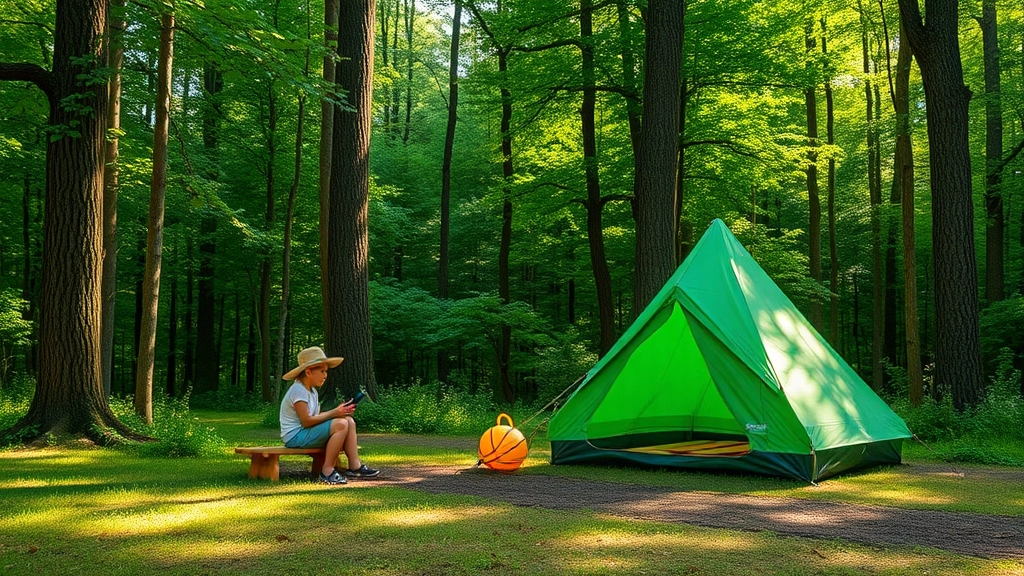STEM Summer Camps: Engaging Kids in Learning
As summer approaches, parents often wonder how to keep their kids engaged and learning. Enter the world of STEM summer camps, where curiosity meets innovation. These camps offer a diverse range of experiences, from coding and robotics to engineering challenges and science experiments. Whether your child is a tech enthusiast or a budding scientist, there’s a camp tailored just for them.
In this article, we explore the various types of STEM summer camps available, their benefits, and how to choose the right one for your child. From understanding age groups and skill levels to discovering leading organizations offering these camps, we’ve got you covered. Plus, we’ll delve into success stories, cost considerations, and the debate between virtual and in-person camps. Ready to embark on a journey of discovery? Let’s dive in!
Types of STEM Summer Camps
Ever wondered if a STEM summer camp is right for your child? Let’s break it down, no fluff. There are loads of options out there, and it can be overwhelming. So, what types of STEM summer camps are available?
1. General STEM Camps
These camps cover a broad range of STEM subjectsâScience, Technology, Engineering, and Mathematics. They’re perfect for kids who have a general interest in STEM but aren’t sure which area they love the most yet. Think of it as a sampler platter.
2. Science Camps
Focused purely on scientific exploration, these camps dive deep into biology, chemistry, physics, and environmental science. If your kid is fascinated by the natural world or loves doing experiments, this is the camp for them.
3. Technology Camps
These camps are all about the latest tech trends. From coding and app development to robotics and AI, technology camps are ideal for kids who are glued to their gadgets and want to create something amazing with them.
4. Engineering Camps
Engineering camps focus on problem-solving and building. Kids get hands-on with projects like bridge building, robotics, and even aerospace engineering. If your child loves to tinker and build, this is their playground.
5. Mathematics Camps
For those who see the world in numbers, math camps are a great fit. They cover everything from basic arithmetic to advanced topics like calculus and statistics. Perfect for kids who love puzzles and problem-solving.
6. Specialised Camps
Some camps focus on niche areas like marine biology, astrophysics, or biomedical engineering. These are great for kids who already have a specific interest and want to dive deep.
7. Virtual STEM Camps
In the age of digital everything, virtual camps have become super popular. They offer the flexibility to learn from home and often provide access to top-notch instructors from around the world.
8. In-Person STEM Camps
Nothing beats the hands-on experience and social interaction of an in-person camp. These camps are great for kids who thrive in a collaborative environment and love face-to-face learning.
9. Day Camps vs. Residential Camps
- Day Camps: Perfect for younger kids or those who prefer to return home each evening.
- Residential Camps: Great for older kids who are ready for a bit of independence and want an immersive experience.
10. Local vs. National Camps
- Local Camps: Convenient and often more affordable, these camps are run by local schools, universities, or community centres.
- National Camps: Often more prestigious and may offer unique opportunities, but they can be pricier and require travel.
Real Talk: What’s the Best Fit?
Choosing the right camp depends on your child’s interests, age, and comfort level. Here’s a quick checklist to help you decide:
- Interest: What subjects or activities does your child gravitate towards?
- Age: Is the camp suitable for your child’s age and maturity level?
- Location: Do you prefer local or are you okay with travelling?
- Format: Does your child prefer virtual or in-person experiences?
- Duration: How long is the camp, and does it fit into your summer plans?
If you’re looking for a comprehensive guide to summer camps, check out our Comprehensive Guide to Summer Camp Costs. For more tips on how to make your child’s camp experience unforgettable, explore our Ultimate Packing Guide for Summer Camp Essentials.
Benefits of Attending a STEM Summer Camp

Worried that your kid might waste their summer glued to a screen?
Wondering how to keep them engaged and learning?
STEM summer camps could be your answer.
They’re not just about keeping kids busy. They offer real benefits that can shape your child’s future.
Here’s why:
1. Hands-On Learning
Kids don’t just sit and listen. They get their hands dirty.
- Building robots.
- Coding games.
- Conducting experiments.
These activities make learning fun and memorable.
2. Boosts Problem-Solving Skills
STEM camps throw real-world problems at kids.
They learn to think on their feet.
They figure out solutions.
This builds critical thinking and problem-solving skills.
3. Encourages Teamwork
Most projects are group-based.
Kids learn to communicate.
They share ideas.
They work together to achieve common goals.
Teamwork is a skill that will serve them well in any career.
4. Enhances Creativity
STEM isn’t just about science and maths.
It’s about creativity.
- Designing apps.
- Creating new gadgets.
- Inventing solutions.
These camps foster out-of-the-box thinking.
5. Builds Confidence
When kids complete a project, they feel accomplished.
They see their ideas come to life.
This boosts their confidence.
They start to believe in their abilities.
6. Prepares for Future Careers
The world is moving towards tech.
STEM skills are in high demand.
These camps give kids a head start.
They explore careers in science, technology, engineering, and maths.
7. Keeps Learning Fun
Summer is a break from school.
But learning doesn’t have to stop.
STEM camps make learning fun and exciting.
Kids stay curious and engaged.
8. Real-World Applications
Kids see how what they learn applies to the real world.
This makes education relevant.
It answers the age-old question, “When will I ever use this?”
Popular STEM Activities and Projects
Ever wonder what makes a STEM summer camp so exciting? Let’s dive into some of the most popular STEM activities and projects that get kids hooked. Trust me, these aren’t your typical classroom exercises. We’re talking hands-on, minds-on experiences that make science, technology, engineering, and maths come alive.
1. Robotics and Coding
Robotics and coding are often the rock stars of STEM camps. Kids get to build their own robots and program them to perform tasks. Imagine the thrill of seeing your creation move for the first time! Plus, coding isn’t just about writing lines of code; it’s about problem-solving and creativity.
Key Activities:
- Building Robots: Using kits like LEGO Mindstorms or VEX Robotics.
- Programming: Learning languages like Python or Scratch.
- Competitions: Robot battles or obstacle courses.
2. Engineering Challenges
Engineering projects are all about designing, building, and testing. It’s like being a mini-engineer for a week. Whether it’s constructing bridges or launching rockets, these activities teach kids the principles of physics and mechanics in a fun, engaging way.
Key Activities:
- Bridge Building: Using materials like popsicle sticks or spaghetti.
- Rocket Launching: Designing and launching water or air rockets.
- Egg Drop Challenge: Creating a device to protect an egg from breaking when dropped.
3. Science Experiments
Nothing beats the ‘wow’ factor of a good science experiment. These activities are designed to spark curiosity and make scientific concepts easy to understand. From chemistry to biology, there’s something to pique every interest.
Key Activities:
- Chemical Reactions: Creating volcanoes or slime.
- Biology Projects: Studying plant growth or animal behaviour.
- Physics Demos: Exploring principles like gravity and magnetism.
4. Tech and Gadgets
Let’s face it, kids love gadgets. Incorporating technology into STEM activities makes learning incredibly engaging. From virtual reality to drones, the tech world offers endless possibilities.
Key Activities:
- Virtual Reality: Exploring virtual worlds or creating VR content.
- Drones: Learning to pilot drones and understanding their mechanics.
- 3D Printing: Designing and printing 3D objects.
5. Environmental Science
With growing awareness about environmental issues, many camps include activities focused on sustainability and ecology. These projects teach kids the importance of protecting our planet while making science tangible and real.
Key Activities:
- Recycling Projects: Creating art or functional items from recycled materials.
- Water Quality Testing: Analysing local water sources.
- Gardening: Understanding ecosystems by growing plants.
Why These Activities Matter
So, why are these activities so popular? It’s simple. They make learning fun and relevant. Kids aren’t just sitting at desks; they’re building, experimenting, and problem-solving. These hands-on experiences help them understand complex concepts in a way that’s both engaging and memorable.
If you’re looking for more ideas to make your child’s summer camp experience unforgettable, check out our Ultimate Summer Camp Packing Checklist and discover Creative Summer Camp Themes for All Ages.
How to Choose the Right STEM Summer Camp

Alright, so you’re thinking about sending your kid to a STEM summer camp. But with so many options out there, how do you pick the right one?
Let’s break it down.
What Are Your Goals?
First off, what do you want your child to get out of this experience?
- Do they love coding?
- Are they into robotics?
- Or maybe they’re curious about space?
Knowing their interests will help you narrow down the choices.
Research the Camp’s Curriculum
Next up, dive into the camp’s curriculum.
- Are the activities hands-on?
- Do they cover a range of topics or focus on one area?
- Are the projects designed to challenge and engage?
You want a camp that offers a balanced mix of fun and learning.
Check the Instructors’ Credentials
Who’s teaching your kid?
- Are the instructors qualified?
- Do they have experience in STEM fields?
- Are they good with kids?
Look for camps that hire professionals who can inspire and guide your child.
Consider the Camp’s Reputation
Word of mouth is powerful.
- What are other parents saying?
- Are there reviews online?
- Does the camp have any awards or recognitions?
A camp with a solid reputation is usually a safe bet.
Location and Logistics
Practical stuff matters too.
- Is the camp nearby?
- Do the dates work with your schedule?
- What are the daily hours?
You don’t want to commit to a camp that’s a logistical nightmare.
Cost and Financial Aid
Money talks.
- What’s the cost?
- Are there any hidden fees?
- Do they offer financial aid or scholarships?
Make sure the camp fits your budget.
Safety Measures
Last but not least, safety.
- What are their safety protocols?
- Do they have first aid on site?
- How do they handle emergencies?
Your child’s well-being is paramount.
Age Groups and Skill Levels Catered
Alright, let’s talk about something every parent worries about: Is this STEM summer camp right for my child’s age and skill level? I get it. You don’t want your kid feeling out of place or overwhelmed. So, let’s break it down.
Age Groups: Who’s In?
STEM camps are pretty good at catering to various age groups. Here’s a quick rundown:
- Early Learners (Ages 5-7): These camps focus on fun, hands-on activities that introduce basic concepts. Think simple coding games, basic robotics, and easy science experiments.
- Primary School (Ages 8-10): At this stage, kids dive into more structured projects. They might build simple circuits, create basic computer programs, or explore environmental science.
- Middle School (Ages 11-13): Here, the complexity ramps up. Kids could be designing more intricate robots, working on intermediate coding projects, or even dabbling in chemistry and physics.
- High School (Ages 14-18): These camps often offer advanced projects. Expect things like app development, complex engineering challenges, and in-depth scientific research.
Skill Levels: From Newbies to Pros
Now, age isn’t the only factor. Skill level matters too. Camps usually break it down like this:
- Beginner: No prior experience needed. Perfect for kids just getting their feet wet in STEM.
- Intermediate: Some basic knowledge required. Maybe your child has done a bit of coding or built a simple robot before.
- Advanced: For the kids who are already mini-experts. They might be coding whizzes or budding engineers.
How Camps Cater to Different Levels
So, how do camps actually cater to these different groups and skill levels? Here’s the scoop:
- Tailored Curriculum: Activities and projects are designed to match the age and skill level of the participants. No one-size-fits-all here.
- Flexible Grouping: Kids are often grouped by both age and skill level. This ensures they’re working alongside peers at a similar level.
- Expert Instructors: Good camps have instructors who know how to engage kids at different levels. They can challenge advanced students while making sure beginners don’t feel lost.
- Progressive Learning: Many camps offer tiered programmes where kids can advance to more difficult levels as they gain experience.
Real Talk: Why This Matters
Imagine signing up your 8-year-old for a camp designed for high schoolers. They’d be lost and probably end up hating STEM. On the flip side, an advanced 14-year-old in a beginner camp would be bored out of their mind. Getting the age group and skill level right is crucial for keeping your child engaged and excited about learning.
So, next time you’re looking at STEM camps, pay close attention to the age groups and skill levels they cater to. It’ll make all the difference in your child’s experience. And if you’re still unsure, check out our STEM Gem Summer Camp at Georgia Tech for an excellent example. Additionally, for those looking for a variety of engaging activities, our Summer Camp Art Activities offer great benefits and tips.
Leading Organizations Offering STEM Camps

Ever wondered which organisations offer the best STEM summer camps?
Let’s dive into the top names making waves in the STEM camp world.
National Geographic Kids
National Geographic Kids is a big deal.
They’ve got camps that make learning about science and nature super fun.
Think hands-on experiments, cool field trips, and projects that make kids go, “Wow!”
Mad Science
Mad Science camps are all about making science exciting.
They offer a mix of chemistry, physics, and even space-themed camps.
Kids get to do real experiments and learn from actual scientists.
iD Tech
iD Tech is a go-to for tech-savvy kids.
They offer camps on coding, game design, robotics, and more.
Plus, their instructors are top-notch, often coming from big tech companies.
Camp Invention
Camp Invention is perfect for young inventors.
They focus on creativity, problem-solving, and hands-on projects.
Kids get to build their own inventions and even take them home.
Tech Camp UK
Tech Camp UK is a local favourite.
They offer a range of tech-focused camps, from coding to robotics.
And, they cater to all skill levels, so there’s something for everyone.
The Royal Institution
The Royal Institution offers camps that are both educational and fun.
Kids get to explore different areas of science, from chemistry to physics.
Plus, they get to use real lab equipment.
Code Ninjas
Code Ninjas is all about coding.
Kids learn to code by building their own video games.
It’s a fun way to learn a valuable skill.
The Raspberry Pi Foundation
The Raspberry Pi Foundation offers camps focused on computing.
Kids get hands-on experience with Raspberry Pi computers.
They learn to code, build projects, and even create their own gadgets.
STEM Learning UK
STEM Learning UK offers a variety of camps.
They cover everything from biology to engineering.
And, they have camps for different age groups and skill levels.
Microsoft’s DigiGirlz
Microsoft’s DigiGirlz is a camp just for girls.
They focus on inspiring young women to pursue careers in tech.
Girls get to meet female role models and work on cool tech projects.
Why These Organisations Stand Out
These organisations aren’t just about teaching STEM.
They’re about inspiring kids to love learning.
They offer hands-on experiences that make science and tech come alive.
Plus, they have top-notch instructors who know how to make learning fun.
How to Choose the Right Camp
Choosing the right STEM camp can be tricky.
Here are some tips:
- Look at the curriculum: Make sure it covers topics your child is interested in.
- Check the instructors: Look for camps with experienced, passionate instructors.
- Consider the format: Does your child prefer hands-on projects or more traditional learning?
- Think about location: Is the camp close to home, or will you need to travel?
Preparing Your Child for STEM Camp
Worried about how to get your kid ready for STEM camp? You’re not alone. Many parents have the same concerns: “Will my child fit in? Do they need to know a lot about science already? What should they pack?” Let’s break it down so you can feel confident and excited about sending your child off to a summer of learning and fun.
1. Get Them Excited About STEM
First things first, build some excitement around the idea of STEM. Talk about the cool stuff they’ll get to do:
- Hands-on experiments: Who doesn’t love a good science project?
- Robotics and coding: Building a robot or creating a game can be super thrilling.
- Field trips: Some camps offer trips to science museums or nature reserves.
2. Assess Their Current Skill Level
You don’t need to be a genius to enjoy STEM camp, but knowing where your child stands can help:
- Talk to their teachers: Get an idea of their strengths and areas for improvement.
- Do some simple projects at home: See how they handle basic experiments or coding tasks.
3. Pack the Essentials
Packing for STEM camp isn’t much different from any other camp, but a few extras can make a big difference:
- Comfortable clothes: They’ll be moving around a lot.
- Notebook and pen: For jotting down ideas and observations.
- Basic toolkit: Some camps may require items like a calculator, safety goggles, or a laptop.
4. Encourage a Growth Mindset
STEM is all about problem-solving and innovation. Encourage your child to:
- Ask questions: Curiosity is key.
- Embrace mistakes: Failure is just a stepping stone to success.
- Collaborate: Teamwork can lead to amazing discoveries.
5. Familiarise Them with Camp Structure
Knowing what to expect can alleviate a lot of anxiety:
- Daily schedule: Go over a typical day at camp.
- Camp rules: Make sure they understand what’s expected.
- Meet the instructors: Some camps offer introductory videos or meet-and-greet sessions.
6. Practice Basic Skills
A little prep work can go a long way:
- Math and science basics: Brush up on fundamental concepts.
- Computer skills: Familiarise them with basic coding or software they might use.
- Reading: Encourage them to read books or watch videos related to STEM topics.
7. Address Any Concerns
Finally, talk to your child about any worries they might have:
Success Stories from STEM Summer Camps

Ever wondered if a STEM summer camp is worth it?
Got questions about the real impact?
Let’s dive into some success stories that show how these camps can be game-changers.
Real Kids, Real Results
Meet Sarah.
She attended a coding camp last summer.
Before the camp, she was unsure about her tech skills.
Fast forward a year, and she’s built her own app.
Yeah, you read that right.
An app.
She’s now the go-to tech guru at her school.
From Zero to Hero
Then there’s Jake.
He was never into science.
Thought it was boring.
His parents signed him up for a robotics camp.
By the end of the week, he was hooked.
Jake’s now leading his school’s robotics team.
They even won a regional competition.
Building Confidence
STEM camps don’t just teach skills.
They build confidence.
Take Emily, for example.
She was shy and introverted.
After a summer at an engineering camp, she came out of her shell.
Now, she’s presenting her projects in front of her class without breaking a sweat.
Networking and Mentorship
These camps offer more than just education.
They provide networking opportunities.
Kids meet mentors who guide them.
Like Tom, who met a NASA engineer at his camp.
That connection turned into a mentorship.
Now, Tom’s aiming for a career in aerospace engineering.
Future-Ready Skills
STEM camps equip kids with future-ready skills.
Think problem-solving, teamwork, and critical thinking.
These are the skills that matter.
And kids like Maya are proof.
She used her camp experience to ace her school projects and even started a science club.
The Takeaway
STEM summer camps are not just about learning.
They’re about transformation.
They turn curiosity into passion.
Skills into careers.
And dreams into reality.
So, if you’re on the fence, take the plunge.
Your child could be the next success story.
Ready to Dive In?
Choosing the right camp can be overwhelming.
Check out our guide on How to Choose the Right STEM Summer Camp.
And if cost is a concern, don’t miss our section on Cost and Financial Aid Options.
Whether you’re considering a Virtual vs. In-Person STEM Camp, we’ve got you covered.
So, what are you waiting for?
Give your child the gift of a lifetime.
The next success story could be yours.
Want more inspiration? Head over to our Benefits of Attending a STEM Summer Camp section.
Keep it real, keep it fresh, and keep it engaging.
Your child’s future starts here.
Cost and Financial Aid Options
Alright, let’s talk about the elephant in the roomâcost and financial aid options for STEM summer camps. If you’re like me, you’re probably wondering, “How much is this going to set me back?” And more importantly, “Are there any ways to make it more affordable?” Let’s break it down.
What’s the Price Tag?
STEM summer camps can vary widely in cost. Here’s a quick rundown:
- Day Camps: Typically range from £100 to £500 per week.
- Residential Camps: These can be pricier, ranging from £500 to £2000 for a week-long session.
- Specialised Camps: If your child is attending a niche camp focusing on something like robotics or coding, expect to pay a premium, sometimes upwards of £3000.
Why the Price Difference?
Several factors influence the cost:
- Location: Camps in major cities or popular destinations tend to be more expensive.
- Duration: Longer camps naturally cost more.
- Facilities and Equipment: High-tech equipment and state-of-the-art facilities come at a price.
- Instructor Expertise: Camps led by industry experts or university professors will have higher fees.
Financial Aid Options
Good news! There are several ways to make STEM camps more affordable:
- Scholarships and Grants:
- Many camps offer scholarships based on merit or financial need. For more details, check out our Ultimate Guide to Summer Camp Scholarships.
- Check out organisations like the STEM Education Coalition or STEM.org for scholarship opportunities.
- Early Bird Discounts: Sign up early to take advantage of discounted rates.
- Payment Plans: Some camps offer flexible payment plans to spread the cost over several months.
- Employer Assistance: Some companies offer educational benefits or reimbursements for employee children attending STEM programs.
- Local Grants and Community Funds: Look into local government grants or community organisations that support educational programs.
Real Talk: Is It Worth It?
I get it, spending hundreds or even thousands on a summer camp might seem daunting. But think about the long-term benefits:
- Skill Development: Your child will gain valuable skills that can set them up for future success. For a comprehensive list of activities that combine fun and learning, see our guide on Summer Camp Activities: Fun and Learning Combined.
- Networking: They’ll meet like-minded peers and mentors who can guide them.
- College Applications: Participation in a reputable STEM camp looks fantastic on a college application.
Quick Tips to Save Money
- Group Discounts: Some camps offer discounts for group registrations. Team up with friends!
- Local Camps: Sometimes local universities or community centres offer more affordable options.
- Virtual Camps: These are usually cheaper and can be just as enriching.
Virtual vs. In-Person STEM Camps
Alright, let’s talk about it.
“Should I send my kid to a virtual STEM camp or an in-person one?”
I get it.
It’s a big decision.
Both options have their pros and cons.
Virtual STEM Camps
Pros:
- Convenience: No commute. Your kid can learn from the comfort of home.
- Flexibility: Many virtual camps offer recorded sessions. Missed a class? No worries, just catch up later.
- Cost-Effective: Generally cheaper. No travel or accommodation costs.
- Global Reach: Your child can join a camp from anywhere in the world.
Cons:
- Screen Fatigue: Too much screen time can be draining.
- Limited Hands-On Activities: Some projects just aren’t the same without physical materials.
- Social Interaction: Less face-to-face interaction. Tougher to make new friends.
In-Person STEM Camps
Pros:
- Hands-On Learning: Real-life experiments and projects. Nothing beats the real thing.
- Social Skills: Your kid gets to meet and interact with peers. Builds teamwork and communication skills.
- Structured Environment: A dedicated space for learning. Fewer distractions.
- Memorable Experiences: Field trips, lab visits, and more. These are the stories they’ll tell for years.
Cons:
- Logistics: Travel, accommodation, and other logistics can be a hassle.
- Cost: Generally more expensive. Factor in travel, meals, and maybe even lodging.
- Health Concerns: Especially relevant now. Always a consideration with in-person gatherings.
Which One’s Right for Your Kid?
It boils down to what you and your child need.
Consider These Factors:
- Age and Skill Level: Younger kids might benefit more from hands-on, in-person activities.
- Budget: Virtual camps are usually lighter on the wallet.
- Learning Style: Some kids thrive in a structured, physical environment. Others do just fine online.
- Health and Safety: Always a priority. In-person camps should follow strict health guidelines.
Real Talk
I’ve seen kids flourish in both settings.
One parent told me their child, who was shy and reserved, blossomed in a virtual camp.
Another shared how their hands-on learner thrived in an in-person environment, making friends and memories.
Final Thoughts
Virtual or in-person, both have their unique perks.
The key is to match the camp to your child’s needs and your family’s situation.
Got more questions?
Check out our other sections on Types of STEM Summer Camps and How to Choose the Right STEM Summer Camp.
FAQs on STEM Summer Camps
What are the benefits of attending a STEM summer camp?
STEM summer camps offer hands-on learning, boost problem-solving skills, encourage teamwork, enhance creativity, and build confidence. They also prepare kids for future careers and keep learning fun.
How do I choose the right STEM summer camp for my child?
Consider your child’s interests, research the camp’s curriculum, check instructors’ credentials, and look into the camp’s reputation. Also, consider location, logistics, cost, and safety measures.
Which organizations offer top STEM summer camps?
Leading organizations include National Geographic Kids, Mad Science, iD Tech, Camp Invention, and Microsoft’s DigiGirlz, among others. These camps are known for their engaging programs and expert instructors.
What success stories have emerged from STEM summer camps?
Many kids have transformed their interests into skills and confidence. Stories include kids building apps, leading robotics teams, and gaining mentorships that guide their future careers.
Are there financial aid options for STEM summer camps?
Yes, many camps offer financial aid or scholarships. It’s important to inquire about these options when considering the cost of a camp.
What should I know about the safety measures at STEM camps?
Ensure the camp has clear safety protocols, first aid on site, and a plan for handling emergencies to ensure your child’s well-being.
Why are STEM skills important for future careers?
The world is increasingly tech-driven, and STEM skills are in high demand. These camps provide a head start in exploring careers in science, technology, engineering, and maths.
How do STEM camps make learning fun?
STEM camps integrate real-world applications and exciting projects, making education relevant and answering the question, “When will I ever use this?”
References
-
National Geographic Kids – STEM Camps
-
Mad Science – STEM Camps
-
iD Tech – STEM Camps

